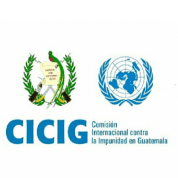The International Commission Against Impunity in Guatemala (CICIG) was created in December 2006 by the United Nations on the request of the Guatemalan government, officially in order “to eradicate illegal groups and clandestine security structures that operate in Guatemala.”

While the CICIG, whose headquarters are located in New York City, claims on its webpage it is politically, organizationally and financially “independent,” the voluntary contributions it depends on have mainly come from the United States – with up to US$21 million contributed up till 2013.
In September that year, Washington warmly welcomed the decision to appoint former Colombian auxiliary magistrate Ivan Velasquez Gomez, who was also veteran of paramilitary investigations at the head of the institution.
In March, U.S. Vice President Joe Biden, during a visit in Guatemala, strongly recommended Otto Perez Molina's administration to renew the CICIG mandate to combat corruption and impunity in the country, suggesting the U.S. Congress could otherwise suspend the U.S. aid to Latin America’s North Triangle, which includes Honduras and El Salvador.
However, Perez Molina immediately refused what he considered to be impositions from abroad, though the commission was initially a Guatemalan request. In doing so, the president was also supporting the country's judges who complained about the independent body’s interference – 18 of them had been accused of corruption in November 2012.
RELATED: Central America Rising
This declaration sparked a major controversy in the country, as the extension of the mandate was backed by a broad range of sectors, including within the ecclesiastic and the entrepreneurial ones, along with numerous social and human rights groups.
In eight year, the CICIG had successfully unveiled a handful of major corruption scandals involving public officials, resulting in the trials of an ex-president, a police chief, and a former defense minister, among others. It also helped the government to reform structural changes within the judicial and police system.
A month later, under massive popular pressure, Perez Molina finally agreed to renew the anti-impunity body for two more years, in a bid to ease the political crisis.
The decision was made as the CICIG had just uncovered a massive customs tax-fraud and contraband scheme involving dozens of public officials, including the secretary of former Vice President Roxana Baldetti.
“It was surprising, although no coincidence, that he reversed his stance right after CICIG exposed the customs scandal, which reached all the way up to the vice presidency,” Bridget Brehen, director of the Network in Solidarity with the People of Guatemala (NISGUA) told teleSUR.
Since then, the scandal referred to as “The Line” took immense coverage, leading to the arrest of Baldetti, while the Guatemalan Congress has just agreed to strip Perez Molina of immunity, paving the way for the leader to be investigated over the corruption allegations.